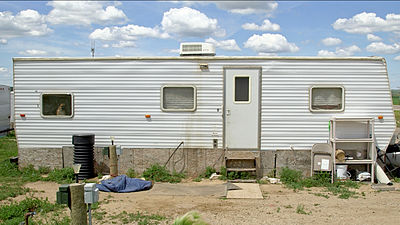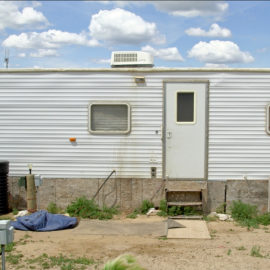
That looks like a lovely place to live. I guess if I lost a home it would look better. But what if I had to stay for a longer time and the rent is charged? That is happening to some who were displaced for Laura, over two years ago.
Mary Cormier and her daughter slept wherever they could in the months after Hurricane Laura destroyed their trailer, including in her pickup truck at times. FEMA eventually provided them a mobile home – but that, too, may not be an option much longer. “There’s hardly no low-incomes,” she said of the search for a new home for her and her 36-year-old daughter, both of whom have health issues. “And once there is, there’s so many people that need the place, they jump on it before we can get there.” The Cormiers are currently living in a trailer park on the outskirts of Lake Charles. They are among the 1,750 families who are set to begin paying rent to remain in FEMA temporary housing provided after Hurricanes Laura and Delta devastated southwest Louisiana in 2020. Some say they simply can’t pay it, and the difficulty of finding another home at a time of a severe affordable housing shortage in the Lake Charles area prevents them from moving elsewhere. Their dilemma highlights the challenges around post-disaster housing, which is meant to be temporary but ends up filling longer-term needs in the absence of other solutions. The problem was exacerbated in Lake Charles by a drawn-out delay in federal long-term recovery money, much of which will be used to address housing needs.
theadvocate.com
That is a conundrum that is not unexpected. What do you do if the only housing built is for the middle to upper class? What if you have a low paying job and can’t afford to rent in what is available?
Two other weather disasters – a harsh winter storm that burst pipes in February 2021 and heavy flooding in May – further slowed the recovery, as did the pandemic. From FEMA’s perspective, the temporary housing program is always intended to last 18 months, and the deadline to move out for Laura survivors was originally set for the end of February. At the request of the state, that was extended until Oct. 31 for both Laura and Delta survivors, but on the condition that rent would have to be paid. The state pointed out in its request that it took months, or even a year or more, for some to move into trailers in the first place due to various complications. Rents are based on federal fair market assessments, but with reductions allowed based on income. Those with especially low incomes can qualify for rent of $50 per month, FEMA says. “In many cases, survivors may end up paying rents far below fair market rates for comparable properties,” FEMA says. Families can also appeal the rent amount, but will have to pay what is owed if it is rejected. Rents begin this month for Laura survivors and next month for those provided housing linked to Delta.
The rents seem excessive for what you are paying for. They also seem to be higher than what low cost housing should cost.
A sampling of some of the rents being charged include $885 a month for Cormier’s two-bedroom mobile home and $1,107 for a nearby three-bedroom unit. FEMA says rents not paid within 30 days can trigger debt collection procedures. The state had asked in its extension request that rents be waived. Louisiana’s two U.S. senators, Bill Cassidy and John Kennedy, along with the region’s congressman, Rep. Clay Higgins, have also asked FEMA to waive rent payments due to conditions in Lake Charles. “Hurricanes Laura, Delta, a severe winter storm, and the May 2021 flood event caused extensive damage to the region and created major disruptions to the recovery process,” the joint letter from the three Republicans to FEMA Administrator Deanne Criswell says. “These disasters were in addition to pandemic-related challenges, lumber shortages, and nationwide supply chain issues that have hamstrung construction and rebuilding efforts. These compounding issues have caused extensive delays for Southwest Louisiana families trying to return to permanent housing.”
The story seems to be one that is replicated in both the same area and others. After every disaster.
Shannon Parker, 51, is among those who have been on an unwelcome odyssey in the wake of the disasters. His rental house was destroyed by Laura and he spent months in a hotel in New Orleans, paid for by FEMA. He eventually ended up at the same trailer park as Cormier, living with his fiance and 18-year-old stepson in a three-bedroom unit. He received his notice from FEMA last month saying he would have to begin paying $1,107 in rent starting in April, but his disability checks will not cover it. He’s filed an appeal, but isn’t sure what he’ll do if it fails. He says he has no relatives in the area who could take him in. “I can’t afford it,” said Parker, who is on disability following heart surgery. “Everywhere we go to look for a place, since the hurricane, they’ve went up on the rent.”
The hurricanes and the following storms took a heavy cut from houses. The follow on storms only contributed to the damage.
The hurricanes took a heavy toll on housing. Laura, one of the most powerful storms to ever make landfall in Louisiana, ripped off roofs with its fierce 150-mph winds. Delta, a Category 2 storm six weeks later, dumped water into many of those damaged houses. One study has estimated that around half of all homes in Calcasieu Parish, whose main city is Lake Charles, were damaged to varying degrees. Hundreds of public housing apartments remain out of commission, and around 1,300 families have been on the waiting list for Section 8 homes in Calcasieu. FEMA and other federal agencies have spent hundreds of millions on immediate needs after the storms, but long-term recovery aid was slow in coming. Congress did not approve an initial appropriation until September 2021, more than a year after Laura, and that $600 million was deemed by state and local officials as far too little. The federal government followed up last month by allocating a further $450 million, which officials now deem sufficient to address housing needs. But the battle is not yet won. Bureaucratic procedures mean none of that money has been distributed yet. The state is in the process of complying with all requirements to begin distributing rebuilding grants. It hopes housing programs linked to it can be up and running in June. Those who may qualify are being encouraged to fill out a survey at restore.la.gov.
This all seems to be more complicated than what should be a fairly straight forward procedure.
For Jennifer Trivedi, a University of Delaware professor who wrote a book on Mississippi’s post-Katrina recovery, said rent-free periods have been extended by FEMA in the past in “cases where they deem things so serious.” That was true after Katrina, she said. But alternatives to the current system of post-disaster housing that have been tested have so far all come with issues of their own, including the “Katrina cottages” built to house disaster victims, said Trivedi. A combination of solutions will likely be needed, particularly when considering storm victims with special needs or those who are particularly vulnerable when displaced. “I haven’t seen anything that’s been 100% effective,” said Trivedi. “The problem is that it’s so complicated and there’s so many moving parts for so many different people that you have to have a response that has different components involved with it.
Part of the complexity is that no two problems are the same.
There’s no one-size-fits-all solution.” The gaps in the system can be seen in the case of the Cormiers, who owned a trailer on their own property in Sulphur, near Lake Charles, before Laura took off the back of it. Delta then dumped water inside of it, which produced mold. They stayed with friends when possible and at a hotel, but had to resort to sleeping in their truck at times, they said. Mary Cormier’s husband died nine years ago, and in addition to her own health issues, her daughter is hearing impaired and has vision problems. They collect Social Security disability. They eventually moved into the FEMA mobile home about a year ago and it has given them a steady place to live. But she won’t be able to afford the rent and is appealing it. The 57-year-old hopes to sell the land where her former trailer was located. “That’s kind of hard, whenever all that was paid for,” she said of her former home. “And now I’m having to pay something. I can’t afford that.”
Income disparity and unions are hopefully coming back. These are the cases that so many don’t know about.


